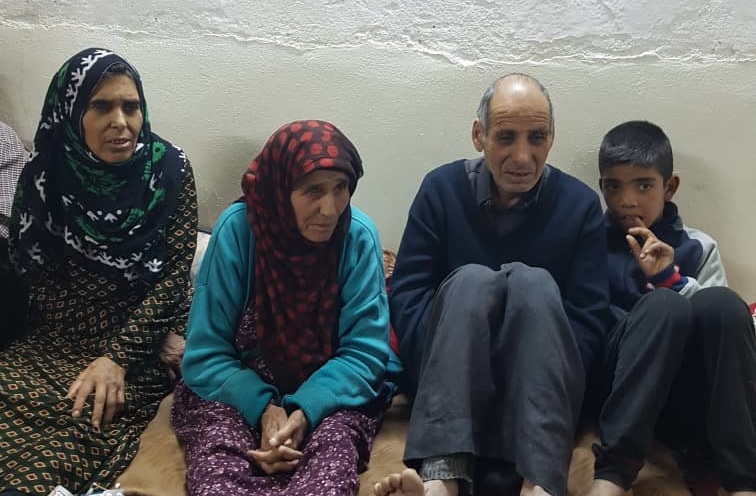
A family in north-east Syria
By Ben Small
Ninety per cent of older people in north-east Syria have to rely on the support of friends and families to meet their basic, daily needs, according to a new rapid needs assessment of older people (RNA-OP) coordinated by HelpAge International.
Carried out with local partners the Syrian Expatriate Medical Association and Al-Ameen, the RNA-OP highlights concerning evidence of older people’s rights being denied.
Challenges in the region are significant. Although Isis has been driven away, basic services are highly disrupted, with infrastructure destroyed and a lack of qualified staff. Tensions still exist between the Kurdish and Turkish populations too, causing uncertainty about the future. An estimated 1.6 million people need assistance across three governorates, including 900,000 acutely in need, according to UNOCHA.
Half of the 614 older people surveyed in the refugee, returnee and host communities said their local medical centres have run out of drugs, while 15% said their personal supplies of essential medicines had completely run out.
One-in-four older people said they cannot get enough food to eat, with half citing a lack of income as a major barrier. Indeed, 85% said they had to borrow money to make ends meet, leaving many older people in debt that may be difficult to pay back without a sustainable income.
Three-in-ten respondents said they do not have access to safe drinking water, often due to the long distances to water points, and two-thirds said their shelters need repairs.
The impact of conflict and displacement in north-east Syria has had a worrying impact on older people’s psychosocial wellbeing, with three-quarters saying they need support to be able to cope, and more than half saying they feel isolated and neglected.
Although the vast majority of respondents were depending on others, three-quarters (77%) still have caring responsibilities, including for children, other older people and people with disabilities.
What needs to be done?
The findings from the RNA-OP show that older people’s rights are being denied. Key to addressing this is speaking to these individuals about what their needs are – 85% of older people said they were not consulted by any other humanitarian agencies.
By speaking to older women and men, actors responding can provide assistance that is accountable to older people, tailored to their needs and upholds their human rights. To do this, data, disaggregated by age, sex and disability, must be collected to ensure responses are appropriate, while complaints mechanisms must be put in place to enable recipients to escalate any grievances.
Outreach is into communities is key. Many older people are invisible during crises as physical barriers prevent many from leaving their homes. These people and their dependants should be found and registered, with plans made to ensure they receive aid and can access services. Communicating using accessible visual and verbal formats, with a consideration to local languages and by people who have been properly trained, is vital.
Programmes should include older people, including those with disabilities. Supporting older people’s participation in the response and recovery by developing leadership skills and providing roles for them within their communities is critical.
Engaging with UN clusters and other inter-agency coordination mechanism at local, country and global levels is vital, as is using the Humanitarian inclusion standards to ensure responses in each sector are inclusive.
“The four principles of humanitarian action – humanity, neutrality, impartiality and operational independence – afford everyone in north-east Syria the right to safe and dignified access to assistance and protection without discrimination. Our rapid needs assessment shows that this is not happening,” said Verity McGivern, Humanitarian Advocacy Adviser, HelpAge International.
“Older people in north-east Syria must be able to access aid with dignity and in safety, and our recommendations in this report can help humanitarian agencies to make this a reality.”
Find out more
- Download the RNA-OP full report and executive summary.
- Visit our partners the Syrian Expatriate Medical Association and Al-Ameen websites.
- Read RNA-OP reports from other contexts.
